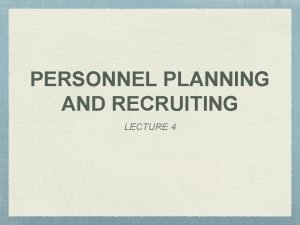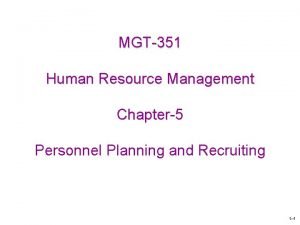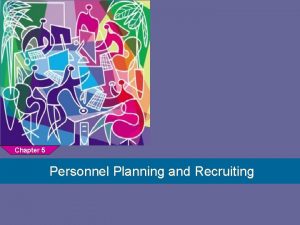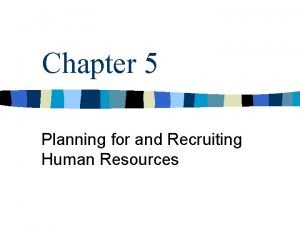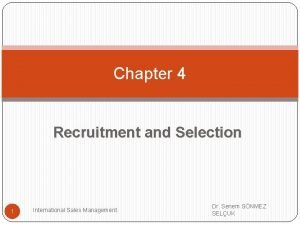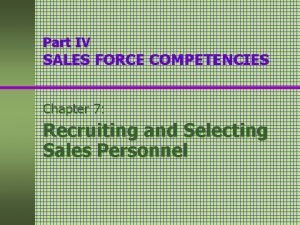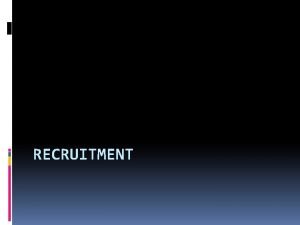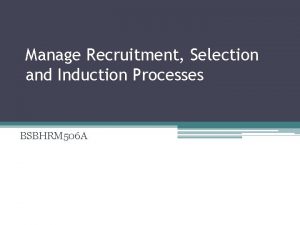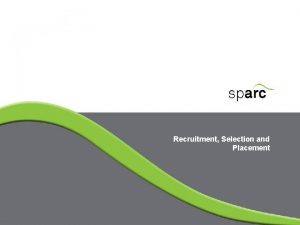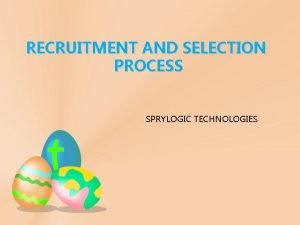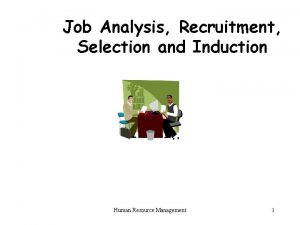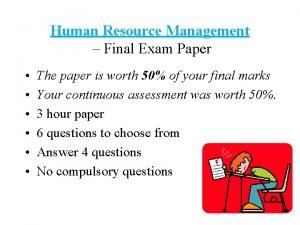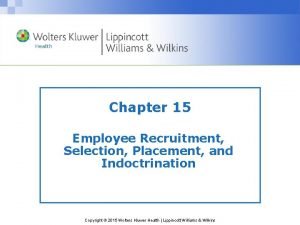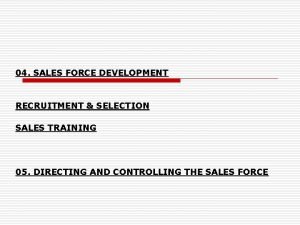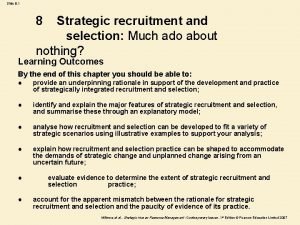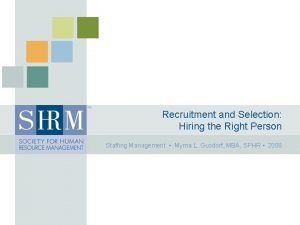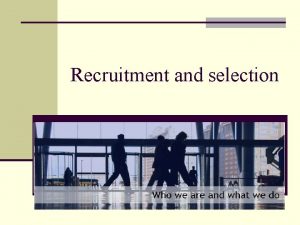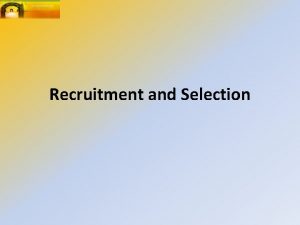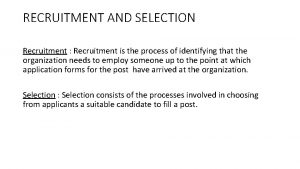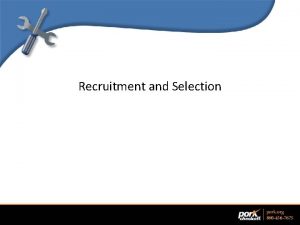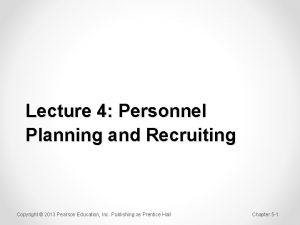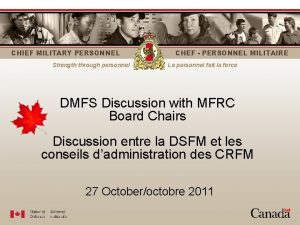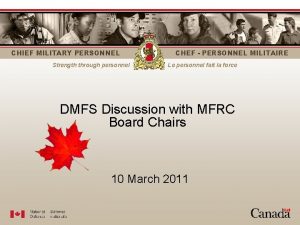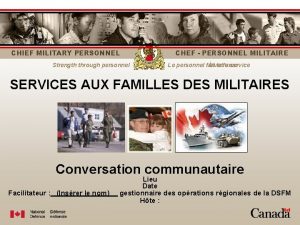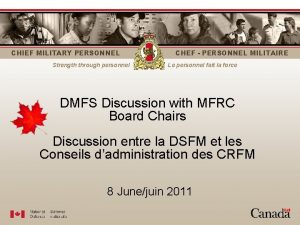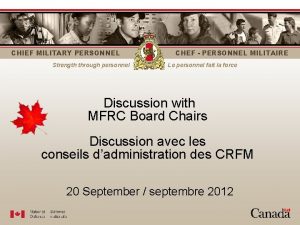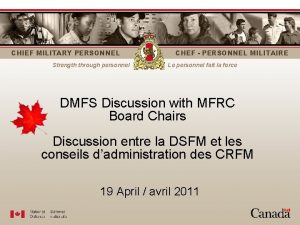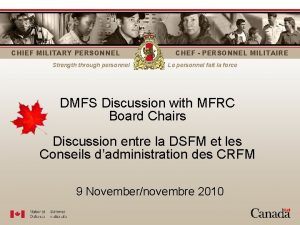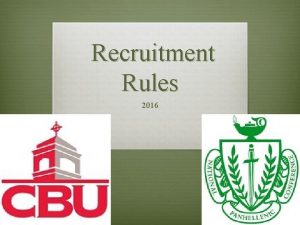PERSONNEL PLANNING AND RECRUITING LECTURE 4 RECRUITMENT SELECTION






















- Slides: 22

PERSONNEL PLANNING AND RECRUITING LECTURE 4

RECRUITMENT & SELECTION PROCESS Decide which positions to fill. Build a pool of candidates for these jobs. Have candidates complete application forms. Use selection tools. Decide who to make an offer to.

WORKFORCE PLANNING AND FORECASTING Workforce (or employment/personnel) planning is the process of deciding what positions the firm will have to fill and how to fill them. Personnel plans require some forecasts or estimates. The basic workforce planning process is to forecast the employer’s demand for labour and supply of labour.

PERSONNEL PLANS Forecasts or estimates of 3 things: 1. Personnel Needs 2. The supply of inside candidates 3. The supply of outside candidates

FORCASTING PERSONNEL NEEDS FORECASTING TOOLS TREND ANALYSIS RATIO ANALYSIS SCATTER PLOTTING

TREND ANALYSIS Trend analysis- Study of a firm’s past employment needs over a period of years to predict future needs.

RATIO ANALYSIS A forecasting technique for determining future staff needs by using ratios between 1. some causal factor (such as sales volume) 2. the number of employees required (such as number of sales people)

SCATTER PLOT Scatter plot- A graphical method used to help identify the relationship between two variables. Example- sales and your company’s staffing levels.

FORECASTING THE SUPPLY OF INTERNAL CANDIDATES Qualification Inventories Manual Systems and Replacement Charts Computerised Skills Inventories

QUALIFICATIONS OR SKILLS INVENTORIES Manual or computerised records listing employees’ education, career and development interests, languages, special skills, and so on, to be used in selecting inside candidates for promotion.

MANUAL SYSTEMS OR REPLACEMENT CHARTS Company records showing present performance and promotability of inside candidates for the most important positions.

COMPUTERISED SKILLS INVENTORIES Larger firms use various packaged software systems to track the qualifications of their employees. These programs help management anticipate HR shortages, and facilitate employment recruitment and training plans. Example- Survey Analytics’s Skills Inventory Software.

INTERNAL SOURCES OF CANDIDATES REHIRING FORMAL EMPLOYEES JOB POSTING HIRING FROM WITHIN SUCCESSION PLANNING (HRIS)

SUCCESSION PLANNING The ongoing process of systematically identifying, assessing, and developing organisational leadership to enhance performance.

SUCCESSION PLANNING 3 steps of succession planning: 1. Identify key needs 2. Develop inside candidates 3. Assess and choose

INTERNAL SOURCES OF CANDIDATES ADVANTAGES 1. Knowing candidate’s strengths and weaknesses. 2. More committed to the company. 3. Rise in morale. 4. Less orientation and training. DISADVANTAGES 1. Employees may become discontented. 2. Internal recruitment can often waste time. 3. Inbreeding can be potential drawback.

OUTSIDE SOURCES OF CANDIDATES Recruiting via the internet Websites Apps Facebook Linked. In Other recruitment practices Texting Virtual job fairs

OUTSIDE SOURCES OF CANDIDATES ADVANTAGES Quick responses for a long time Less cost DISADVANTAGES Might exclude disproportionate number of older applicants. Internet overload.

EMPLOYMENT AGENCIES PRIVATE AGENCIES Important sources of clerical, white-collar, and managerial personnel. They charge fees for each applicants they place. WHY USE AN AGENCY? The firm doesn't have its own HR department. Must fill a job quickly. Need to attract more minority or female applicants. Need to reach currently employed individuals, who might feel more comfortable dealing with agencies than with competing companies. Reduce the time devoted to recruiting.

OFFSHORING/OUTSOURCING JOBS OUTSOURCING Having outside vendors supply services that the company's own employees previously did inhouse. OFFSHORING Having outside vendors or employees abroad supply services that the company’s own employees previously did in-house.

RECRUITING A MORE DIVERSE WORKFORCE Women and minorities The disabled Older workers Single parents

DEVELOPING AND USING APPLICATION FORMS Uses of application information Applicant’s education and experience Applicant’s progress and growth Applicant’s employment stability Applicant’s likelihood of success
 Planning personnel
Planning personnel Personnel planning and recruiting
Personnel planning and recruiting Employee forecasting
Employee forecasting Chapter 5 planning for and recruiting human resources
Chapter 5 planning for and recruiting human resources International sales recruitment
International sales recruitment Introduction of recruitment and selection
Introduction of recruitment and selection Recruiting and selecting sales personnel
Recruiting and selecting sales personnel Manned exhibits meaning
Manned exhibits meaning Bsbhrm506
Bsbhrm506 Recruitment policy meaning
Recruitment policy meaning Recruitment and selection course outline
Recruitment and selection course outline Recruitment and selection meaning
Recruitment and selection meaning Recruitment meaning
Recruitment meaning Job analysis recruitment and selection
Job analysis recruitment and selection Exam questions on personnel management
Exam questions on personnel management Selection and placement
Selection and placement Methods of recruitment and selection of salesperson
Methods of recruitment and selection of salesperson Strategic view of recruitment & selection
Strategic view of recruitment & selection Selection in staffing
Selection in staffing Recruitment and selection definition
Recruitment and selection definition Trends in recruitment and selection
Trends in recruitment and selection Recruitment and selection in human resource management
Recruitment and selection in human resource management Recruitment and selection definition
Recruitment and selection definition
